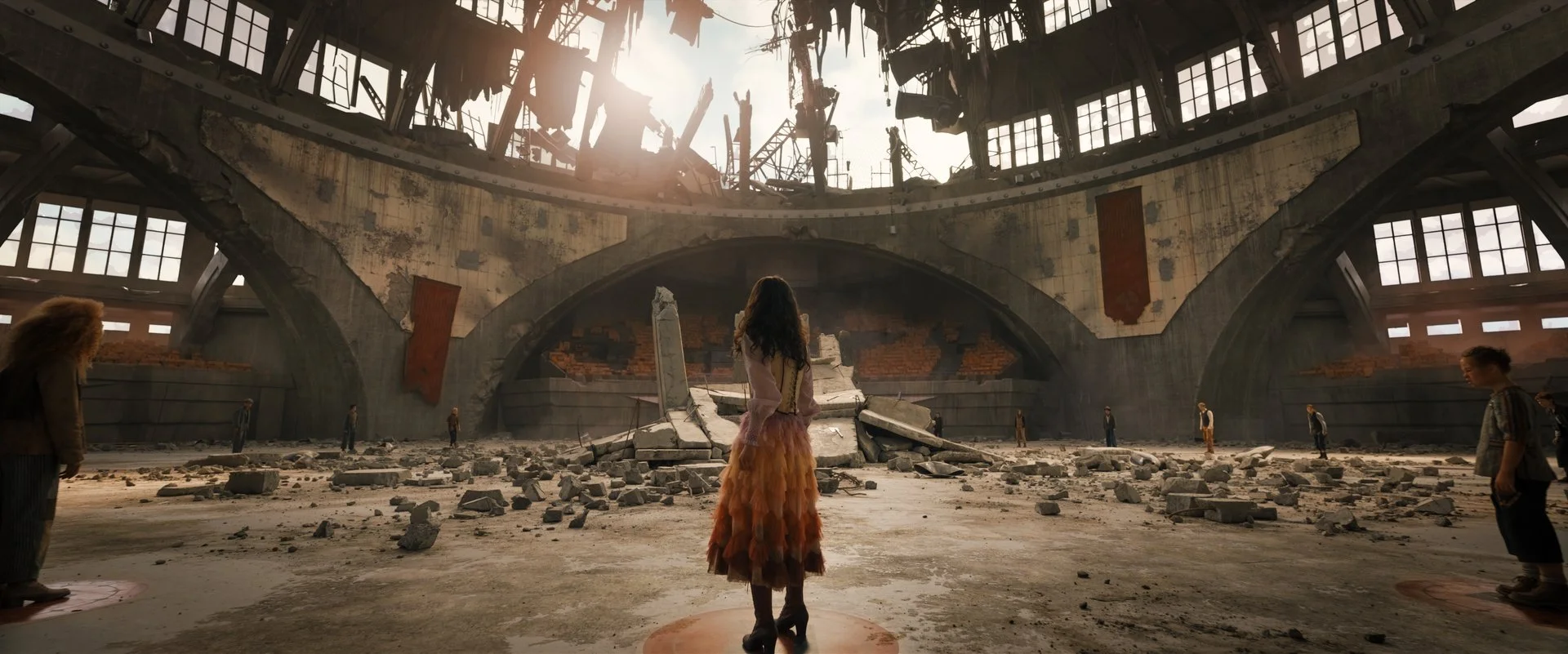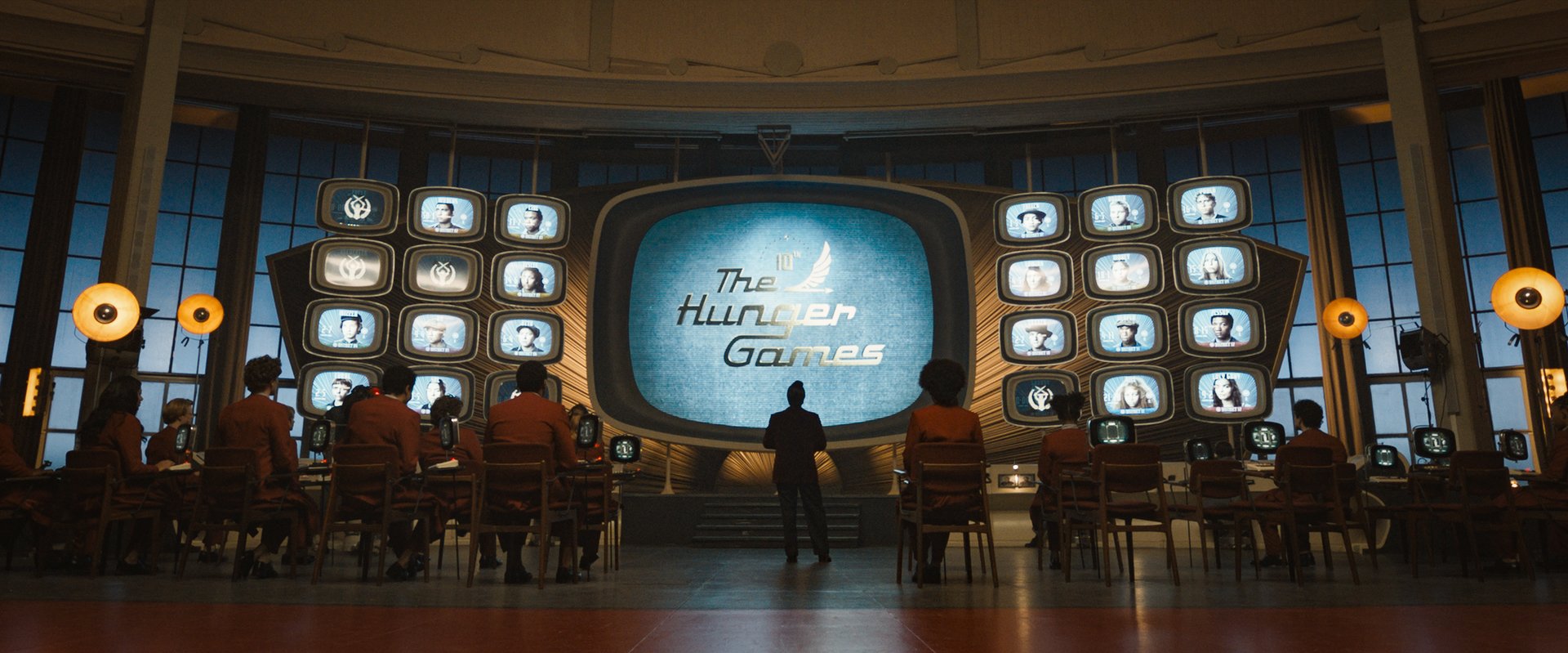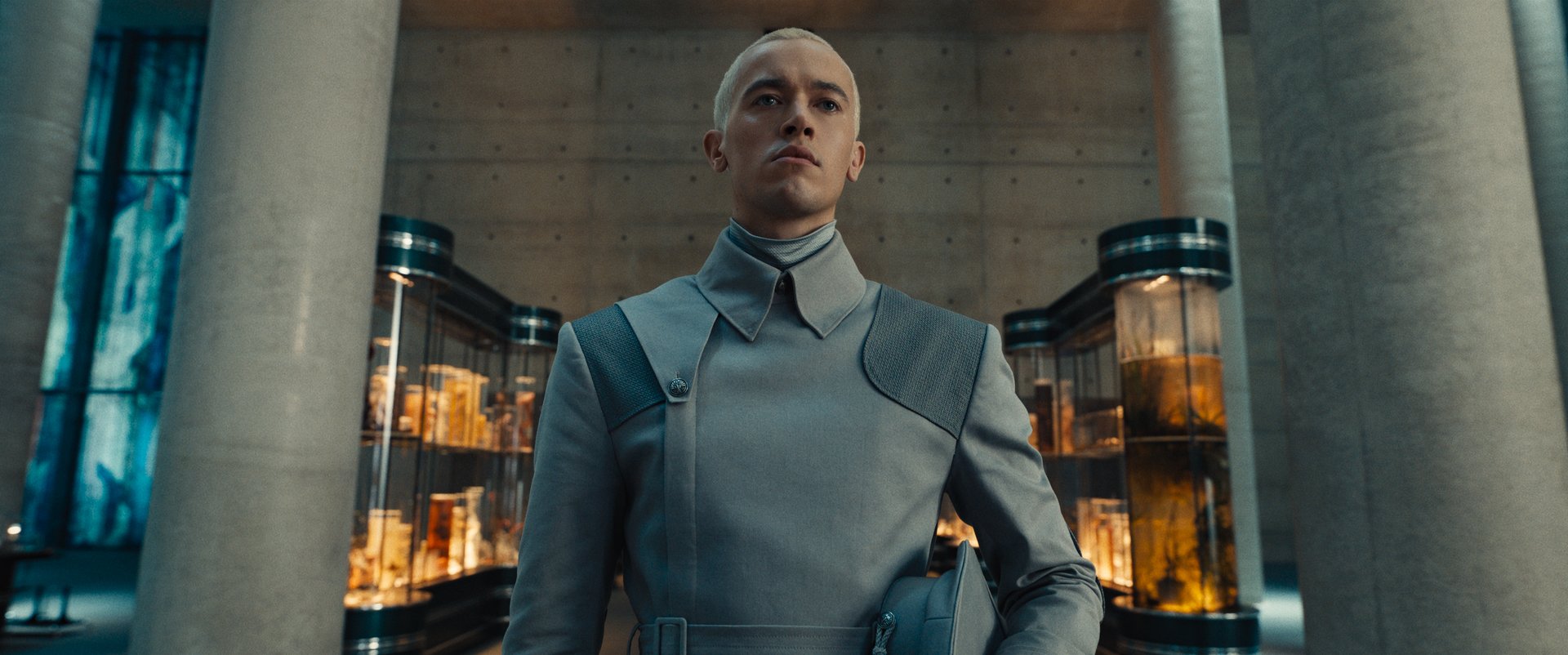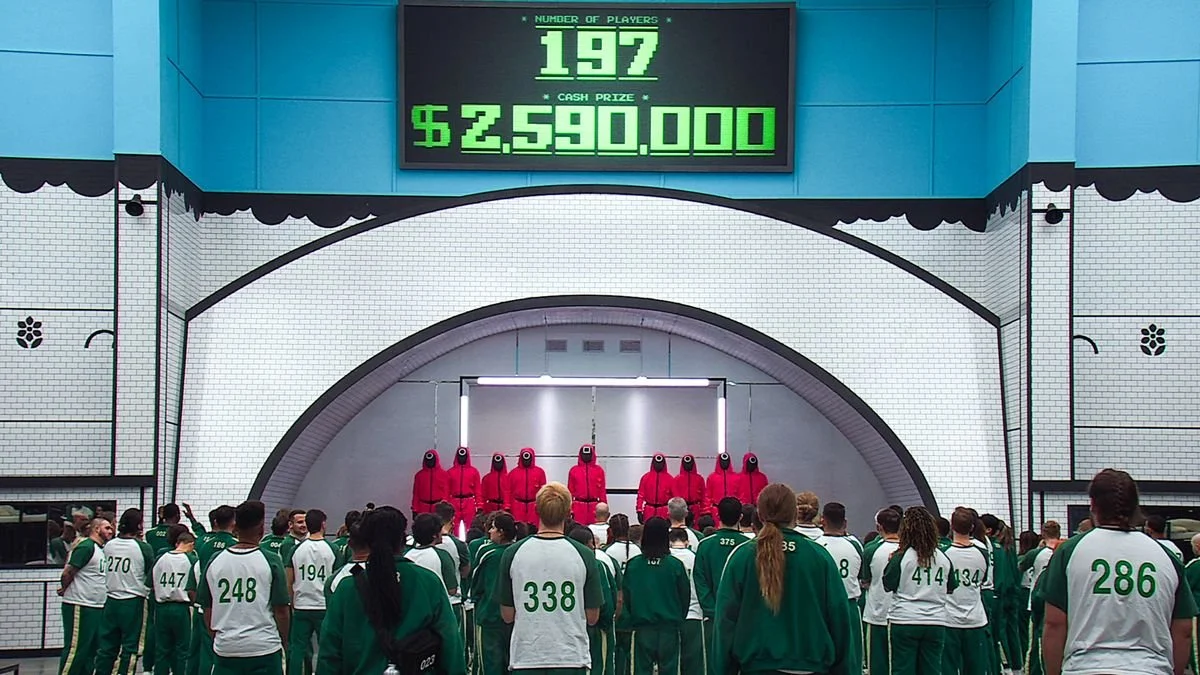The Hunger Games: The Ballad of Songbirds & Snakes | Review
Released at the height of the young adult craze, The Hunger Games’ film legacy is that of the best YA film series since Harry Potter. Many have tried to replicate the latter’s success, but they failed to capture the same zeitgeist: from The Maze Runner films, which were moderate successes, to the Divergent series, whose interest died out before the final film could even be made (there were plans to make the final film into a TV series, instead, but even that desperate plan was eventually cancelled). The most financially and culturally successful of the bunch were the Twilight series, but most of those films weren’t exactly good. The Hunger Games quadrilogy, on the other hand, were not only box office hits, but also critically acclaimed throughout its entire run. But something curious happened—unlike Harry Potter or Twilight, whose respective final films were their highest-grossing installments, the last Hunger Games film, Mockingjay - Part 2, was its lowest-grossing. (The finale made $653 million worldwide, compared to the franchise high of $865 million grossed by Catching Fire.) This meant millions of people chose to forgo seeing the conclusion to Katniss Everdeen’s story, likely due to the absence of the titular games from the final two installments. Eight years later, we now have a new Hunger Games film, and the filmmakers behind the series are betting audiences are still hungry for more.
Coriolanus Snow (Tom Blyth) and Lucy Gray Baird (Rachel Zegler)
Set 64 years before the first film starring Jennifer Lawrence, The Hunger Games: The Ballad of Songbirds & Snakes, based on the dystopian novel of the same name by series author Suzanne Collins, depicts series villain Coriolanus Snow’s origin story. The character was originally portrayed by Donald Sutherland as the authoritarian ruler of Panem, but Snow was not always so evil. In Songbirds & Snakes, he’s just an 18-year-old student (portrayed by Tom Blyth) at a Capitol academy, whose singular goal is to restore his family’s prosperity after his once-noble family became poor and ruinous after the First Rebellion the districts waged against the Capitol. He plans to do this by winning a grand prize associated with the Hunger Games, the televised event in which two children from each district are randomly selected to fight to the death, as collective punishment for their deadly rebellion 13 years prior. Snow and his fellow classmates have been assigned to be the first ever mentors for tributes of the 10th annual Hunger Games.
Snow is assigned to southern belle Lucy Gray Baird (Rachel Zegler), the tribute from District 12 who’s better at disarming others with her singing as opposed to violence; she’s a member of a nomadic music troupe, not a fighter. But luckily for Snow, he doesn’t need Lucy to survive in order for him to win the grand prize. The games’ viewership has been in decline, and the mentors have been instructed by Hunger Games creator Dean Casca Highbottom (Peter Dinklage) to increase ratings. The mentor whose tribute can best entertain audiences will be deemed the winner, regardless if they live or die. But Snow’s plans are disrupted when he develops romantic feelings for Lucy Gray. And therein lies the dilemma: does Snow care more about winning the grand prize, or about Lucy Gray’s survival?
Dean Casca Highbottom (Peter Dinklage), the inventor of the Hunger Games
The first half of Songbirds & Snakes plays much like the first two Hunger Games installments, in which the tributes are selected (“reaped”), the mentors prepare the tributes for the games, and then the actual games themselves. But, unlike the previous films, Songbirds & Snakes doesn’t end when the Hunger Games ends. Instead, there’s still another hour afterwards, depicting the prolonged aftermath of the games, and Snow’s ultimate turn into villainy. But despite its 157-minute runtime—the longest of any Hunger Games film—the film struggles in giving enough time to telling both a Hunger Games story and a Cariolanus Snow origin story. The source novel is also the longest one in the series and its adaptation would have been better served across two films instead of one.
Songbirds & Snakes shares some of the same issues as earlier Hunger Games films, one of which is the lack of character development in many of its characters. Dinklage is a great actor, but his character feels like a rehash of his star-making role as Tyrion Lannister in Game of Thrones—with less screen time. It’s understood early in the film that Dean Highbottom is rooting for Snow’s downfall, but we don’t know why until the film’s conclusion, and by that point it’s too late to care. Viola Davis portrays Dr. Volumnia Gaul, the Head Gamemaster of the Hunger Games, portrayed as a misanthropic mad scientist. But her role as a gamemaster is laughable because, while she is depicted as a researcher and inventor, it’s never clear what exactly she’s planned in the actual games. At this point, the Hunger Games is still in its infancy, set in a decrepit stadium, with no traps or advanced technology, save for drones that deliver gifts to tributes from sponsors (this was Snow’s idea to gain ratings). It’s not until the end of the games, in which Dr. Gaul unleashes genetically modified snakes into the arena—done out of last-minute necessity rather than being planned—that the gamemaster has any influence in the games. Introducing the snakes into the games was not part of Dr. Gaul’s original plan, so then what was? I literally thought to myself, Girl, what do you do?
Head Gamemaster Dr. Volumnia Gaul (Viola Davis)
For a film that’s over two and a half hours long, it sure does gloss over key details quickly, or not at all. It’s never clear what exactly the Academy that Snow attends is. There are many students, but only 12 are assigned to be mentors, and it’s never explained what qualifications there are to be a mentor. Are there only 12 students in every graduating class? And it’s unclear what the grand prize actually is, or how it would revitalize Snow’s family name.
Across all of the films, the time between the reapings and the actual games goes by too quickly, which does a disservice to character development and story pacing. We never get to know the other tributes beyond archetypes, Snow and Lucy Gray’s relationship develops too quickly to feel natural, and we don’t spend enough time seeing Snow strategize and attempt to shape Lucy Gray into the entertainer he needs her to be. Before you know it, Lucy Gray and the tributes are already in the games!
The 10th Annual Hunger Games arena
Ironically, the weakest aspect of the films are the games themselves. The main characters never feel like they actually have to wrestle with the morality of killing other innocent tributes for their survival. Because the other tributes are archetypes, they’re depicted as cruel antagonists who are so unsympathetic you want them to die, allies who are killed by the antagonists, or neutral parties who die by accident. Like Katniss, Lucy Gray (spoiler alert) never has to kill anyone we like, giving them an easy way out of their ethical dilemma and keeping them “pure” in the process.
If the actual games were weak, the revolutionary politics of the series has always been its greatest strength. The original films came out when I was in college, and I don’t remember viewing them as anything more than entertainment. Having recently rewatched them, as an older adult with more political awareness, having lived through unprecedented events since 2016, I found myself surprised at how mature the series’ revolutionary politics was. There have always been popular franchises whose main characters rebel against authoritarian regimes, like Star Wars or Harry Potter, but neither depicted the morality of wartime actions, devastating loss, and the oppressive effects of fascism the way the Hunger Games films did. (Not until the Star Wars television series Andor, that is.) What also distinguished the series from its contemporaries was its focus on the complicity of media and the power of propaganda. In the latest film’s admirable attempts to tell a new story, however, Songbirds & Snakes isn’t as effective in telling its political allegory.
The original Hunger Games films were about sparking and leading a rebellion, while Songbirds & Snakes is about one man’s descent into tyranny. Centering a franchise film on its villain, and portraying him sympathetically, is a juicy storytelling decision, but Snow’s transition into a cold and sociopathic character is not given enough depth. Snow’s father was killed by rebels during the First Rebellion, but we don’t understand how this has affected him. We find out late in the film that Snow’s classmate Sejanus Plinth (Josh Andrés Rivera) is his best friend, but their interactions before this don’t indicate that the two are close at all. And as someone whose family was originally from the districts, Sejanus is the only Capitol citizen we see who is morally and vocally opposed to the games, but we don’t sense any effect this has on Snow. And when it comes to Lucy Gray, it’s unclear when Snow started viewing her in a romantic light instead of as a means to an end. And when Snow finally betrays everyone he loves, it doesn’t feel like a tough decision for him to make. Despite ample time to develop, Snow still lacks interiority. (There is allegedly a four-hour cut of Songbirds & Snakes, which hopefully would’ve been a version of the film that spends more time in developing its characters and pacing.)
Tom Blyth stars as Coriolanus Snow
Despite these flaws, Songbirds & Snakes is still a solidly entertaining entry in the Hunger Games franchise, even if it is the fifth best. (I say “fifth best” because, although it’s the worst film in the series, it’s not a bad film, and I don’t want anyone to mistaken “worst” to mean “bad.”) Directed by Francis Lawrence, who directed the previous three Hunger Games films, and shot by Jo Willems, who worked on Lawrence’s Hunger Games films, Songbirds & Snakes is still a handsomely-made blockbuster, just like previous installments. It looks and feels expensive! Unlike Marvel movies, the CGI and special effects in this film are excellent. The production design is thoughtful, with the Capitol still feeling regal but more raw and less advanced than they were in Jennifer Lawrence’s films. Even though their characters are underdeveloped, the cast is all top-notch, which has always been a strength of the series, having previously featured heavy hitters like Philip Seymour Hoffman, Jeffrey Wright, Julianne Moore, and Mahershala Ali. Viola Davis chews up every scene she’s in. Rachel Zegler shows why she’s a rising star, and even shows off her strong singing voice several times throughout the film. And Tom Blyth gives a dedicated performance, even if the film does him a disservice.
Songbirds & Snakes is an admirable prequel that does what any good spinoff should do—tell its own standalone story that offers something new to the franchise instead of feeling like a cheap rehash. It’s not quite successful in these attempts, but it should satiate the appetite of fans who were looking for more stories in this world.












